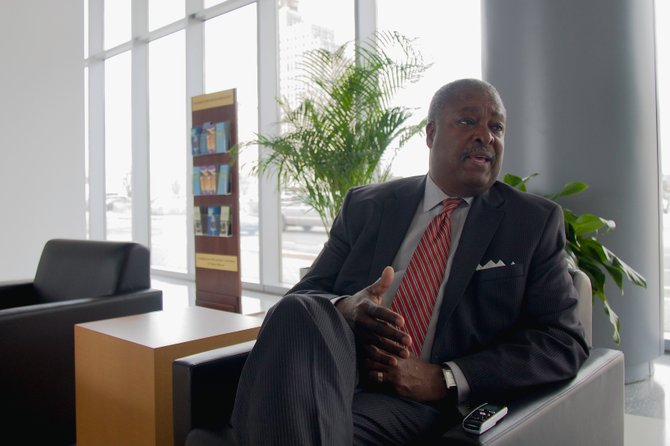The Jackson City Council voted Monday to approve a proposal by Mayor Harvey Johnson Jr. to inject $10 million into street repaving. Photo by Trip Burns.
The condition of city streets may be the hottest issue during the 2013 Jackson mayoral campaign. It has become a running joke among Jacksonians, but in reality, it's a huge problem with few answers.
But that could change. After voting down a $10 million bond issue to repave Jackson streets just a month ago, the Jackson City Council voted Monday to capitalize on low interest rates and borrow $10 million to $12 million to be repaid over 10 years. Work will be conducted in all seven wards and could start as early as this summer.
The measure passed 3-1, with the lone vote in opposition coming from Ward 2 Councilman and mayoral candidate Chokwe Lumumba. He asserted that he was more likely to vote for the bond this time around, but ultimately favored sending the motion back to the budget subcommittee.
"The thing that makes me feel a little bit different about this than the last time we broached it is the explanation of the interest rates and how they might change, so I think it's important to note that we should take advantage of those," Lumumba said. "On the other hand, my slogan is that the people must decide, and so what I'm trying to do is make sure that the people have a voice on this issue, because it is a question of putting the city into some additional debt on top of the $27 million, and I believe we already refinanced some of that, that the city already has."
Lumumba also pointed to the absence of three council members--Ward 3 Councilwoman LaRita Cooper-Stokes, Ward 4 Councilman and mayoral candidate Frank Bluntson, and Ward 5 Councilman Charles Tillman--as reason to shelve the issue until the next full council meeting. He noted that the four representatives in attendance were the minimum required for a vote, and that such a significant motion should not be voted on in a "special session."
But the session has been on the calendar since before the new year, and City Council President Tony Yarber called the vote.
"Councilman Lumumba, typically I would agree with you on that," Yarber answered. "The reason I do not, at this point, is that we've had issues getting folks to come to work over the past three months, and I'm not so sure we should be bidding to people who don't come to work, and hoping they come to work next time. You come to work, and I come to work, and we're going to vote on this today."
The city will pay off the bond over a 10-year period with money allocated to normal street resurfacing. Ward 1 Councilman Quentin Whitwell expressed concern over diverting all of the city's funds for street repairs to repaying that debt. Johnson assured the council that money would be diverted from other areas to refill those resurfacing funds so that work can continue over the next decade.
Jackson has spent $26 million to pave 87.3 miles of streets since 2009. That's enough to cover roughly 7.5 percent of the nearly 1,200 miles of streets Johnson says lie within the city limits.
Johnson held a teleconference town-hall meeting last week, and in a poll of the more than 3,500 participants, roads rated as the top concern, just ahead of crime. Johnson seized the opportunity to tout his record on reconstruction and paving, and he talked about future, planned projects. The mayor said the city has $25 million reserved for reconstruction of major thoroughfares.
"Everyone sees the project on Fortification (Street) going on, but we are also going to be on West Street between Adelle and Woodrow Wilson," Johnson said. "We're going to extend the Jesse Mosely Drive down on Bloom Street between Farish Street. We're going to work on Lynch Street from Wiggins Road to Ellis Avenue. We're going to extend on West County Line Road from the entrance to Tougaloo all the way down to North Field. We have a lot of reconstruction projects going on."
The proposal the city council voted down in February would have allotted the city $10 million for street repairs in February. The lack of oversight and a list of streets targeted were among council concerns. Ward 4 Councilman Frank Bluntson said he was concerned the proposal allowed funds to go beyond streets and sidewalks, and Ward 1 Councilman Quentin Whitwell said the annual millage would have to go toward repaying the bonds for the next 10 years if the proposal passed. That, he said, would take away all of the council's power over street projects.
"(A bond) is not the best way to pay for street repairs, but our streets are in such a condition that we need a big injection of cash," Johnson said last week. "... What I was proposing is work on three or four major thoroughfares in the city of Jackson, like State Street between Shepherd and Northside Drive, or Northside between State and (Interstate 55) or Capitol (Street) between Rose and Crandit. ... That's what I was proposing, but that was rejected.
"I still want to do that. We need to do something about streets right now. I am prepared to do it, but I really need some cooperation from the city council to do it."
Johnson got that cooperation Monday.
The paving projects in the bond measure include work on high-traffic areas on Mill Street, Jefferson Street, Mayes Street, Ellis Avenue, McDowell Road, Capitol Street, Clinton Boulevard, Robinson Road, Lynch Street, Northside Drive, State Street, Watkins Drive, Flag Chapel Drive, Meadowbrook Road and Ridgewood Road. The mayor also plans to repave 28 other streets as part of the regular Residential Resurfacing Program by the first week of April.
It's a lofty goal, and some are greeting the timing--just a few months before municipal elections--with suspicion.
"It's too little, too late," Democratic mayoral challenger Jonathan Lee said Tuesday. "The mayor has been saying for four years that the bond issue is not the best way to pay for fixing the roads, so why now is he saying we need to do it?"
Lee insisted his stance against the bond is not a vote against roads, but against massive spending to fix a problem that, in his eyes, should have never been such an issue in the first place. "We want to create a measure that makes paving streets a more disciplined activity. We have to prioritize streets, so what we plan to do is move the roads budget out of the general fund and put it into a protected special fund. That gives us the discipline to keep our hands off of it. This is nothing new.
"You should be able to go online and click on your street and see when is the last time it was repaved and when is it due for repaving."
Attorney Regina Quinn, another mayoral candidate, issued a release Tuesday in response to the city council's Monday vote.
"The citizens are tired of Harvey Johnson's election-man plans." Quinn wrote. "I was pleased when the council originally said no to his reactive political plan to levy a $10 million bond for paving roads just to bolster his re-election bid.
"... His timing seems very politically convenient, and he is using long-term debt for a short-term fix."
Quinn called Johnson's paving record "significantly misleading," writing that Johnson was not the force behind many projects.
Not so, Johnson's Campaign Communications Director Melissa Faith Payne said. She said that Johnson first proposed the bond in August, and she cited low interest rates as the reason for Monday's proposal.
"The mayor has had a repaving program for years," Payne said. "None of this is brand new. He's always put aside money to repave streets, and his record stands for itself. ... The mayor has his duty to answer to the citizens, and they have told him they want him to fix the streets. That's what he's doing."
Comment at www.jfp.ms. Email Tyler Cleveland at tyler@jacksonfreepress.com.




Comments